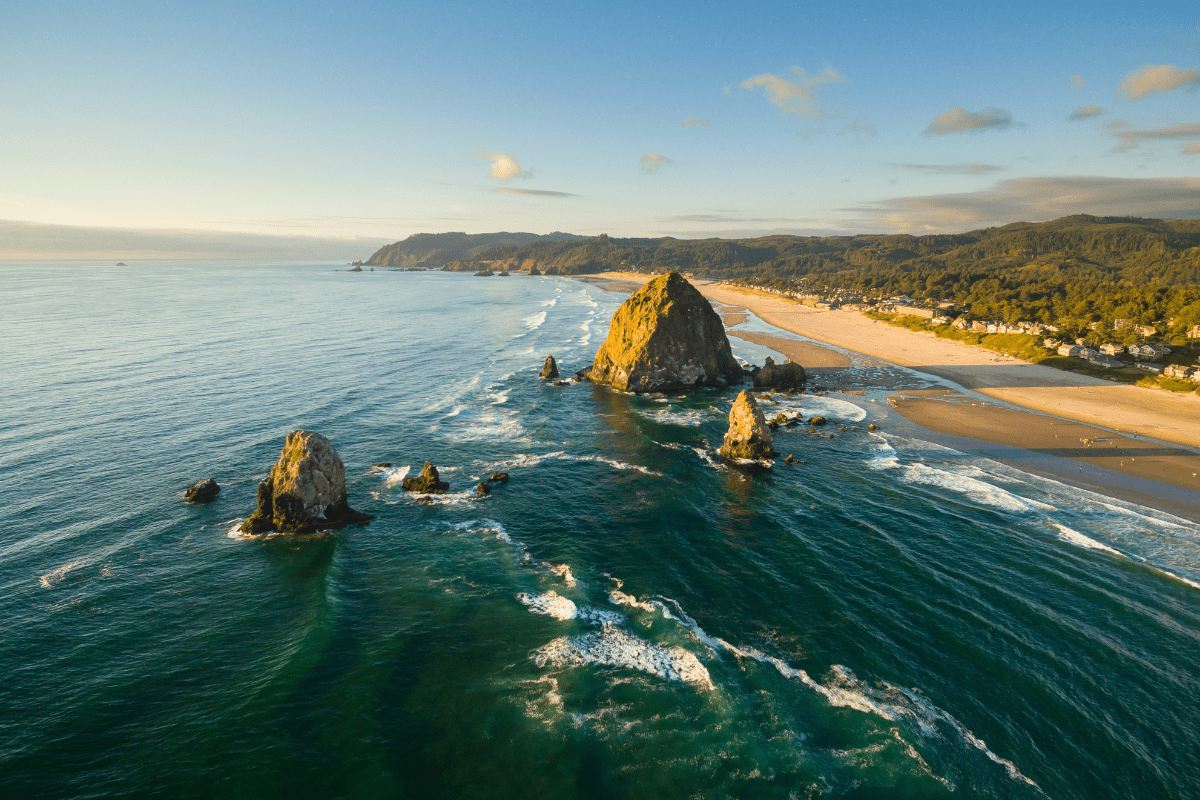Living in Vancouver, Washington is like having a cheat code for Pacific Northwest adventures. You're close enough to Portland to grab brunch without commitment, yet far enough from the chaos to maintain your sanity. Plus, you get to skip Oregon income tax while accessing some of the region's most jaw-dropping destinations within a two-hour radius.
The waterfalls that put Instagram to shame
The Columbia River Gorge serves up waterfalls like a conveyor belt of natural spectacle, with Multnomah Falls just 39 minutes away via I-84. This 620-foot cascade has become so popular that the Forest Service now requires $2 timed-entry permits from May through September, because apparently we can't have nice things without bureaucracy.
Before you panic about permits, here's the local hack: arrive before 9am or after 6pm and skip the reservation circus entirely. Early morning visits offer the bonus of golden light hitting the falls without competing with tour buses full of people wielding selfie sticks. The parking situation can get medieval on summer weekends, so bring patience or comfortable walking shoes.
Lesser-known gorge gems
While everyone stampedes toward Multnomah, the Historic Columbia River Highway harbors quieter treasures like Latourell Falls and Wahkeena Falls. These spots offer equally impressive water features with a fraction of the human traffic. Wahkeena connects to Multnomah via a loop trail, giving you waterfall overload in one ambitious hike.
Beacon Rock State Park, 55 minutes from Vancouver, features what might be the Pacific Northwest's most vertigo-inducing hiking trail. The path to the 848-foot summit includes 52 switchbacks with bridges and walkways literally bolted into the rock face. It's like climbing a very tall, very exposed staircase that engineers designed after drinking too much coffee.
Mount Hood's year-round playground
Mount Hood sits just 60 miles from Vancouver, transforming from winter wonderland to summer hiking paradise depending on the season. Timberline Lodge operates lifts ten months annually, making it America's longest ski season for those who enjoy sliding down mountains on expensive planks.
Winter visitors need to embrace Oregon's chain law requirements from November through April. Yes, you must carry chains regardless of your vehicle's supposed invincibility. The state doesn't care about your all-wheel drive or your confidence… they want chains in your trunk or they want your money via fines.
Summer hiking that doesn't require mountaineering skills
Mirror Lake Trail delivers Mount Hood's most photographed reflection in a manageable 4.2-mile loop. The lake sits perfectly positioned to capture Hood's summit like nature's own photo studio. Arrive early though, because parking lots typically fill by 8am on summer weekends. Nothing ruins a peaceful nature experience like circling for parking spaces while other hikers judge your parallel parking skills.
Trillium Lake offers similar mountain reflection opportunities with the added bonus of paddle sports. The water stays surprisingly warm through late summer, perfect for those brave enough to test Pacific Northwest lake temperatures. Pro tip: bring layers because mountain weather changes faster than your friend's relationship status.
Oregon coast adventures that don't require overnight planning
Seaside's sandy beaches sit just 97 minutes away via US-26, close enough for legitimate day trips without hotel reservations or packing drama. The town's 1.5-mile oceanfront Promenade dates to the 1920s and provides weather-proof walking regardless of Oregon's famous liquid sunshine.
Seaside Aquarium charges just $10 admission and lets visitors feed harbor seals that bark like enthusiastic dogs demanding treats. It's oddly therapeutic watching marine mammals beg for fish while tourists giggle at their antics. The aquarium hasn't changed much since the 1980s, which either adds vintage charm or suggests they need better fundraising.
Cannon Beach's sophisticated coastal vibes
Cannon Beach, equally accessible at 90 minutes, attracts visitors seeking Instagram-worthy coastlines without carnival atmospheres. Haystack Rock's tide pools reveal colorful sea stars and anemones during low tide, creating natural aquarium experiences for families willing to crouch among slippery rocks.
The Oregon Coast Visitors Association recommends visiting during September's "second summer," when weather remains warm but crowds disappear and accommodation rates drop 20-30%. September combines ideal weather with the satisfaction of having beaches nearly to yourself, plus restaurant servers who actually have time to chat.
Coastal timing tips:
- Check tide schedules for pool exploration
- September offers best weather/crowd balance
- Bring layers (ocean wind changes everything)
- Pack snacks (coastal food prices bite)
Portland's neighborhood personalities
Portland starts just 15 minutes from Vancouver via I-5, making it easier to reach than some Vancouver suburbs during rush hour. Each neighborhood develops its own distinct personality, like a city of small towns that happen to share municipal services and food truck regulations.
Powell's City of Books occupies an entire city block with over one million volumes organized by color-coded rooms that require maps for navigation. The rare book room contains first editions worth collectively millions, though browsing remains free for those who can resist touching priceless manuscripts. Underground parking costs $4 per hour, but considering you might spend half a day wandering literary wonderland, it's reasonable investment.
Cultural experiences that don't require advanced degrees
The Pearl District transforms into an outdoor gallery during First Thursday Art Walks from April through October, with dozens of venues staying open late for free exhibitions. It's like a monthly block party where pretentious art discussions mix with surprisingly affordable wine tastings.
Washington Park offers $8 all-day parking for accessing multiple world-class attractions without moving your car between destinations. The International Rose Test Garden displays 10,000 rose bushes completely free, peaking during June and July when the entire garden explodes in fragrant color. Portland Japanese Garden charges $22.50 for adults but delivers one of the most authentic Japanese garden experiences outside Japan across eight distinct garden styles.
Portland family-friendly costs:
- Rose Garden: Free admission
- Japanese Garden: $22.50 adults
- Oregon Zoo: $26 adults
- OMSI: $19 regular, $5 first Sundays
Quirky Portland experiences
The Bagdad Theater screens first-run movies while servers deliver craft beer and pizza directly to your seat, combining cinema with dinner theater at regular ticket prices. It's a distinctly Portland solution to the eternal question of whether to eat dinner or catch a movie.
Oregon Museum of Science and Industry charges $19 for adults but drops to just $5 on first Sundays, though crowds multiply proportionally. The museum houses the USS Blueback submarine from "Hunt for Red October," offering separately ticketed tours through an actual fast-attack submarine. Where else can you experience claustrophobic military life without enlisting?
Wine country without the pretension
McMinnville sits 69 minutes from Vancouver, serving as the Willamette Valley's unofficial capital with Victorian architecture and sophisticated tasting rooms. Tasting fees range wildly from $5 at Seufert Winery to $65 for Archery Summit's premium experiences, proving that wine appreciation doesn't require bankrupting yourself.
Most wineries waive tasting fees with bottle purchases, and joining a single wine club often provides reciprocal benefits throughout the valley. The Willamette Valley Wineries Association recommends visiting during "Cellar Season" from January through March, when winemakers have time for actual conversations instead of rushing between tour groups.
Local wine without designated drivers
Willamette Valley Vineyards operates a waterfront tasting room in downtown Vancouver, eliminating driving concerns entirely. Their $30 wine blending experiences let couples create custom bottles while overlooking the Columbia River, combining romance with mild intoxication in responsible portions.
Agricultural tourism thrives on Sauvie Island, 35 minutes northwest, where u-pick farms follow nature's calendar religiously. June brings strawberries, July delivers blueberries, and October means pumpkin patches with corn mazes designed to challenge suburban navigation skills.
Seasonal farm activities:
- June: strawberry picking
- July: blueberry harvests
- September: apple season begins
- October: pumpkin patches and mazes
Historical sites that don't bore kids
Fort Vancouver National Historic Site sits just 10 minutes from downtown Vancouver, where the reconstructed 1840s Hudson's Bay Company trading post brings Pacific Northwest history to life without relying heavily on imagination. While grounds access remains free, $7 admission to enter the reconstructed fort includes blacksmith demonstrations and period-accurate buildings that actually engage modern attention spans.
The adjacent Pearson Air Museum shares the same grounds at no additional cost, featuring vintage aircraft and aviation history. Combined, both sites offer full-day exploration for under $10 per person, making it Vancouver's best historical bargain.
Seasonal strategies for maximum enjoyment
Winter transforms the region into a completely different adventure map, with mandatory tire chain possession for all Mount Hood destinations from November through April. Oregon doesn't negotiate on this law regardless of your vehicle's capabilities or your driving confidence.
Spring feeds the Columbia Gorge waterfalls to thundering peaks, with Multnomah Falls flowing at maximum drama during April showers. Summer opens mountain lakes and coastal tide pools but requires advance permit reservations for popular destinations because we apparently can't manage natural resources without complex booking systems.
September emerges as the region's secret weapon month, when coastal "second summer" weather coincides with grape harvest, mountain lakes remain swimmable, and summer crowds evaporate like morning fog. Oregon Coast experiences ideal weather with significantly fewer visitors and reduced accommodation rates during this overlooked season.
Year-round planning tips:
- Winter: carry chains, check road conditions
- Spring: waterfalls peak, expect rain gear
- Summer: book permits early, arrive before 8am
- Fall: harvest season, perfect weather balance
Vancouver's geographic advantages become clear when you realize the sheer variety accessible within a morning's drive. You can surf in Seaside, lunch at a McMinnville winery, and catch sunset from Mount Hood, all without driving more than 90 minutes between destinations. This transforms weekend planning from a logistical challenge into an embarrassment of riches, where the biggest decision involves choosing which adventure deserves your limited free time.





